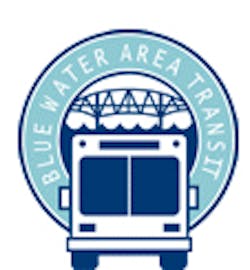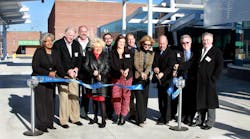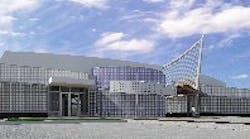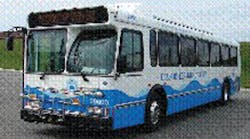Blue Water Area Transit Celebrates 150 Years of Public Transportation Service

Blue Water Area Transit is celebrating the sesquicentennial of public transportation service in the Blue Water Area.
One hundred and fifty years ago, in 1866, Port Huron became one of the nation’s first communities with an operating transit system. The transit agency is also celebrating its own start 40 years ago, when BWAT was established in 1976.
The first local transit system served people arriving in town from Detroit aboard Grand Trunk Railroad trains. A horse-drawn trolley transported passengers from the railroad station to downtown Port Huron.
“Young Tom Edison is known for selling fruit and newspapers aboard local trains, but most people don’t realize that his older brother William also operated a business serving those same train passengers,” explains Jim Wilson, BWAT general manager.
From meagre beginnings with a horse-drawn trolley, William Pitt Edison established the Port Huron and Gratiot Street Railway Company to provide horse-drawn streetcar service along several rail routes. In 1886, Port Huron became one of the first small cities in the country to have electric streetcars. Service was provided by the Port Huron Electric Railway, which was built by the Van Depeole Manufacturing Company of Chicago. After restructuring and expansion, the system became City Electric Railway and provided continuous service until 1930. Electric streetcar service was replaced by a fleet of motor coaches that provided service along streetcar lines. Starting in 1927, bus service continued until an eight-year hiatus from 1968 to 1976, when BWAT was established.
“We’ve had some form of public transit service in the Port Huron area for 142 of the past 150 years,” explains Linda Bruckner, Blue Water Area Transportation Commission Board chair and Fort Gratiot Township trustee.
Blue Water Area Transit continues a proud tradition of innovation in public transit that started 150 Years ago. It was one of the nation’s first communities to operate an electrified trolley system in the 1880s and one of the first to operate motor coaches when they became popular in the 1930s. Privately operated bus service ended in 1968. The current publicly funded bus service began in September 1976. Since then, BWAT has carried more than 28 million riders
Following in the steps of earlier leaders in innovation, BWAT started producing its own compressed natural gas in 1996 and now ranks as Michigan’s largest producer of the alternative fuel. The transit agency runs the state’s largest fleet of natural gas fueled buses and operates four public CNG fueling stations.
Renewal Millage Vote On May 3rd
Blue Water Area Transit will ask local voters on May 3rd to renew the millage that provides their local share of revenues to support the transit agency’s day-to-day operations. The local tax’s revenue combines with other federal and state funding to make up the transit agency’s operating budget of roughly $14 million. The 0.6214 mill tax would cost the owner of a $100,000 house about $31 a year and is expected to generate $347,900 from Port Huron and $239,139 from Fort Gratiot Township during the first year.
“We are not asking for an increase, just a renewal,” explains Jim Wilson, BWAT general manager.
The Headlee Amendment reduced BWAT’s original 0.75 mills to the approximate number where it’s remained for more than ten years. This renewal election is traditionally held in May, since the current millage expires on June 30.






